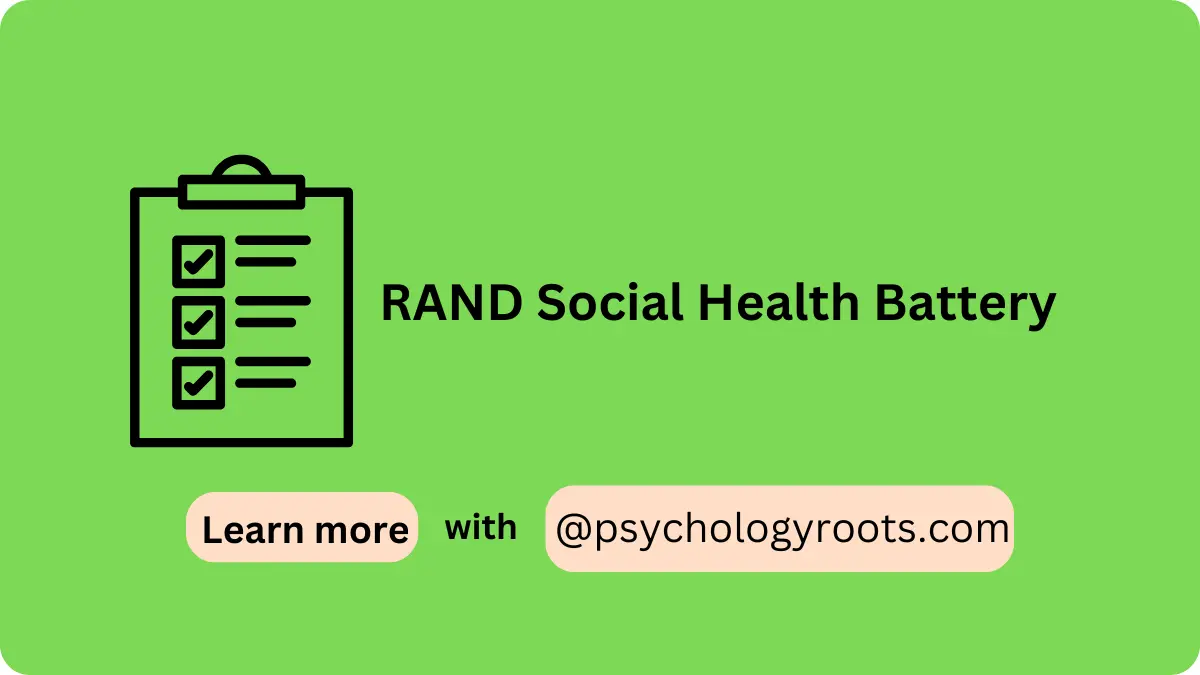Table of Contents
RAND Social Health Battery
Here in this post, we are sharing the “RAND Social Health Battery”. You can read psychometric and Author information. We have thousands of Scales and questionnaires in our collection (See Scales and Questionnaires). You can demand us any scale and questionnaires related to psychology through our community, and we will provide you with a short time. Keep visiting Psychology Roots.
About RAND Social Health Battery
Scale Name
RAND Social Health Battery
Author Details
RAND Corporation (Cathy A. Donald, John E. Ware, Jr., 1978)
Translation Availability
English

Background/Description
The RAND Social Health Battery (RSHB), developed by Cathy A. Donald and John E. Ware, Jr. in 1978, is an 11-item self-administered scale designed to measure social functioning in general population surveys, focusing on objective indicators like social resources (e.g., number of friends) and frequency of social interactions (e.g., visiting friends, group activities). Published in Conceptualization and Measurement of Health for Adults in the Health Insurance Study: Vol. IV, Social Health (RAND Corporation), it was part of the Health Insurance Experiment to assess social health outcomes. The RSHB defines social functioning as the ability to develop, maintain, and nurture major social relationships, distinct from social support or role functioning. It covers three domains: home and family, friendships, and social/community life, excluding work-related or non-interactive activities (e.g., attending sports events).
Items use forced-choice and open-ended responses, scored per a standardized format (Exhibit 4.4 in source) to yield a social contacts subscale (items 3–5), a group participation subscale (items 10–11), and an overall score (excluding items 7 and 8). Higher scores indicate more extensive social contacts, with items standardized to a mean of 0 and standard deviation of 1. The RSHB was validated with 4,603 adults (mean age ≈ 18–65 years, mixed gender, U.S.-based) in the Health Insurance Experiment, showing moderate correlations with psychological well-being (r = 0.32) and emotional ties (r = 0.20). It is used in public health, social psychology, and health policy research to assess social functioning. Access requires permission from RAND Corporation (rand.org).
Administration, Scoring and Interpretation
- Obtain the RSHB from Donald & Ware (1978) or RAND Corporation (rand.org), ensuring ethical permissions.
- Explain to participants (adults 18+ in general population) that the scale measures social interactions and resources, emphasizing confidentiality and voluntary participation.
- Administer the 11-item scale via self-report in survey or community settings, using forced-choice/open-ended responses to capture current social engagement.
- Estimated completion time is 5–10 minutes.
- Ensure a private, supportive environment; provide mental health or community resources (e.g., social support groups) and adapt for accessibility (e.g., large print) if needed.
Reliability and Validity
The RSHB demonstrates moderate psychometric properties (Donald & Ware, 1978). Internal consistency is acceptable (Cronbach’s alpha = 0.72 for social contacts, 0.84 for group participation, 0.68 for overall index, N = 4,603). Inter-item correlations are low, with only 5 of 45 exceeding 0.40. One-year test-retest reliability is moderate (r = 0.55 for social contacts, 0.68 for group participation, 0.68 for overall index; item range = 0.23–0.80).
Convergent validity is supported by correlations with the RAND Mental Health Inventory (r = 0.32), emotional ties (r = 0.20), and general health self-rating (r < 0.20), explaining 12% of mental health variance. Discriminant validity is evidenced by low correlations with unrelated constructs (e.g., physical health). In a study of 256 multiple sclerosis patients, RSHB scores showed moderate decline with disease severity (Spearman rho = -0.31). Item 7 (writing letters) was dropped due to low response and correlation. Pairing with the MOS Social Support Survey or Social Support Questionnaire enhances comprehensive assessment.
Available Versions
11-Items
Reference
WARE JR, J. E., DAVIES-AVERY, A. L. L. Y. S. O. N., & DONALD, C. A. (1978). vol. v, cENERAL HEALTH PERCEPToNs.
Important Link
Scale File:
Frequently Asked Questions
What does the RAND Social Health Battery measure?
It measures objective social functioning via resources and interaction frequency in home, friendships, and community life.
Who is the target population?
Adults (18+) in general population surveys.
How long does it take to administer?
Approximately 5–10 minutes.
Can it inform interventions?
Yes, it assesses social functioning to guide mental health and community interventions.
Disclaimer
Please note that Psychology Roots does not have the right to grant permission for the use of any psychological scales or assessments listed on its website. To use any scale or assessment, you must obtain permission directly from the author or translator of the tool. Psychology Roots provides information about various tools and their administration procedures, but it is your responsibility to obtain proper permissions before using any scale or assessment. If you need further information about an author’s contact details, please submit a query to the Psychology Roots team.
Help Us Improve This Article
Have you discovered an inaccuracy? We put out great effort to give accurate and scientifically trustworthy information to our readers. Please notify us if you discover any typographical or grammatical errors.
Make a comment. We acknowledge and appreciate your efforts.
Share With Us
If you have any scale or any material related to psychology kindly share it with us at psychologyroots@gmail.com. We help others on behalf of you.